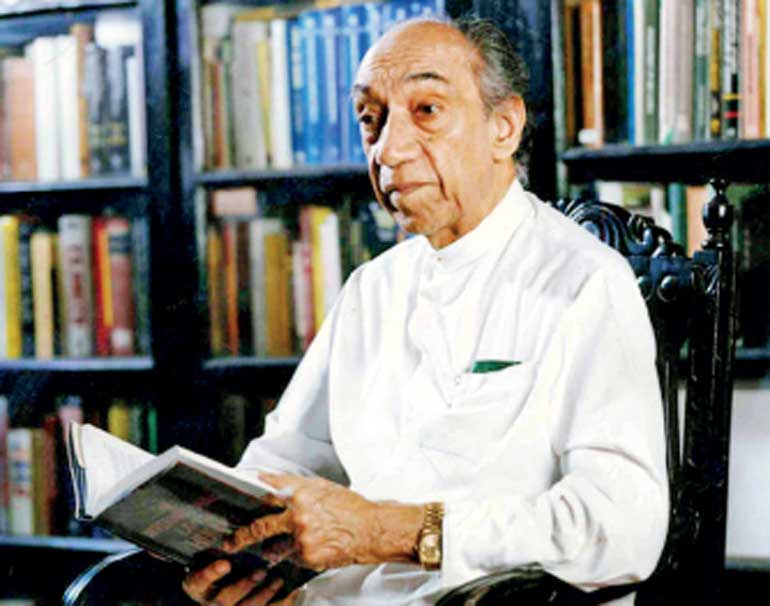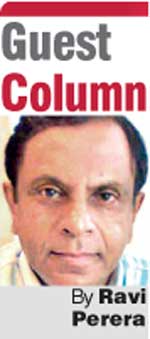Wednesday Feb 18, 2026
Wednesday Feb 18, 2026
Thursday, 31 August 2017 00:02 - - {{hitsCtrl.values.hits}}
 “I am addressing you today from a historic place. It is from this spot that our ancient kings addressed the people. After independence, Prime Ministers of this country have addressed the nation from this very place. It is because you, the people, reposed your confidence in me that I am standing here to address you today. May I therefore express my sincerest gratitude to the people of this country for the confidence placed in me.”
“I am addressing you today from a historic place. It is from this spot that our ancient kings addressed the people. After independence, Prime Ministers of this country have addressed the nation from this very place. It is because you, the people, reposed your confidence in me that I am standing here to address you today. May I therefore express my sincerest gratitude to the people of this country for the confidence placed in me.”
This royal sounding opening is from J.R. Jayewardene, newly elected Prime Minister, addressing the nation (28 July 1977) from the balcony of the Dalada Maligawa. He was triumphant. At the General Elections held on 21 July (1977) the United National Party he led had secured an unprecedented 140 seats out of 168. Nearly 87% of the adult population of Sri Lanka had exercised their franchise to give an emphatic endorsement to the 71-year-old veteran politician.
A few months later, in 1978, the Ministry of Information and Broadcasting brought out a small booklet of J.R. Jayewardene’s speeches titled ‘A New Path’. There are 10 speeches produced, all delivered after the UNP’s electrifying victory of 21 July 1977 and before the second republican Constitution of 1978.
It is clear that he was heads and shoulders above the majority of his party men, who as subsequent events were to show, were mostly careerists, in the lower sense. Public life was a mainly an ego trip for them, acquiring wealth and a social stature being primary. Jayewardene belonged to an older generation of politicians, a participant in the independence movement and a man of cultural sophistication and political depth. Coming from a family of lawyers, reading was habitual, and since it was essentially in English, wide and varied.
“I was speaking of how the sovereignty of the people began, and I would like to cite from a book called ‘The Office of Speaker’ by Philip Laundy, available in our library. King Charles I came with his soldiers. He came into the House. The Speaker was one Lenthall. His name should be revered though he is forgotten. The King pressed the Speaker to surrender to him certain members of the House of Commons, namely Pym, Hampden, Hollis, Hazelrig and Strode. The House of Commons was not then elected as today, but it marked the beginning of parliamentary government. By the time the King came these members had fled, swum across the Thames and escaped. The King said, ‘Well, since I see all my birds have flown, I do expect that you shall send them unto me as soon as they return thither’.
“The Speaker bowed down to the King and dropping to his knees said: ‘May it please your Majesty, I have neither eyes to see, nor tongue to speak in this place, but as the House is pleased to direct me, whose servant I am here; and I humbly beg your Majesty’s pardon that I cannot give any other answer than this to what your Majesty is pleased to demand of me.’ For the first time, the Speaker of the House of Commons had declared his allegiance to the cause of parliamentary liberty. The King retreated.” - From a speech made at the National Assembly on 22 September 1977.
There is more about kings in the speech:
“I would like to say, though we broke away from the monarchy of the United Kingdom, I always felt that the monarch was our own monarch because in 1815, when the Convention was signed, those who signed the Convention voluntarily replaced King Sri Wickrema Rajasinghe by George III, and King George III became the monarch of Sri Lanka in the same way that Tamil kings were brought here. A Nayakkar of South India came here and took the place of Sinhalese Kings.”
It is interesting to note the frequency of reference to kingly tradition in a country said to be a ‘democratic and socialist republic’. Having no discernible history of either democratic or socialist impulse, we fall back on the familiar, institutions historically available as reference points. In societies where ideas of democracy and republicanism primarily developed, feudalism and kings – the surest symbol and bedrock of feudalism – are viewed by and large, as deniers of human rights and even human advancement; institutions that held the people in poverty and ignorance.
On the other hand, given the admiration here for feudal institutions, it is perhaps not surprising that in this so-called democratic and socialist republic many a leader claims the mantle of leadership on the basis of birth, an entitlement, only to treat that public office as a hereditary right to be passed on to his kith and kin.

Could ‘sovereignty’, an inherent right of the people, be transferred so easily by a set of befuddled feudal lords scheming hopelessly for personal gain, unaware that the days were numbered for the small world they inhabited? Now, they were confronting men from many seas away; who knew much and had done much. That gaping difference in power, resources, knowledge and energy between the parties to the Convention renders it meaningless. If, for example, they were compelled to use a modern constitutional instrument like a referendum, would it have been that easy for a few feudal lords to pass on the people’s sovereignty to a Nayakkar from South India and then to George III, living in faraway England? If it is not accepted as a legitimate transfer, was not George III a usurper?
Speaking further, Prime Minister Jayewardene (he was not yet President) moves on to more current issues: “How can a Minister who has 30 to 40 corporations under him know what is happening in the corporations? That is why I want more ministers. We can have 100 ministers out of 140 and still have many left.
“Very often during the period of the previous regime (i.e. the Sirima Bandaranaike regime) the Minister of Justice put his finger into the DPP (Director of Public Prosecutions). We have evidence of that. If one of the Minister’s friends was involved, no further action was taken by the DPP. That will not happen under our Government.”
Reading through the Jayewardene speeches we are struck by the sameness of the problems and preoccupations of our politics. It seems that J.R. Jayewardene was confronting the self-same issues that confound his successors today. If there is to be a theme, it is a story of underdevelopment and general poverty with abuse of power, corruption and nepotism as the most distinguishing features of the status quo. While the leadership has been singularly inept at dealing with these evils, there has been no shortage of bombastic declarations, high-pitched denunciations and grandiose rhetoric. It was so then, and it is so now.
“The Sri Lanka Freedom Party ruled this country for seven long years and before that for four years (under Bandaranaike’s leadership). Her husband was Prime Minister she was Prime Minister and now she is preparing the ground for her son to be Prime Minister! So, having ruled the country for 11 years and been decisively defeated by the people, she now wants to stage a comeback for her family.” – Speech made at the National State Assembly 28 November 1977.
In the same speech Jayewardene goes on to say:
“We have permitted members of this House to sit on a select committee to examine appointments made by this Government. They will also examine the appointment of diplomats who are not career diplomats, chairman of corporations and various other officials. We would examine their bank accounts, whether they have committed any offences and whether they are fit to hold that particular post.
“We have abolished the Criminal Justice Commission laws because they were unjust. We could have used them as they were on our statute book. Members of this assembly were arrested under these laws. They had done no wrong but on a fiat of the Minister of Justice and the Prime Minister they were locked up. They have freedom to put up posters (now).There was a poster I saw saying ‘Chin Chin Nona has gone – Tom Pachaya has come’. Pachaya means a person who speaks untruths. I suppose it was directed at me, but Chin Chin Nona is a reference to Mrs. Bandaranaike.”
On 7 October 1977 J.R. Jayewardene said in the National Assembly thus: “The Police must be fair by all, whoever they be. You cannot let the Police be judges. They are investigators. They keep the peace. They are not judges. They cannot lock up a complainant because he is a UNP man or a TULF man.
“Consider the Dedigama by-election. There was a vote of censure moved in this assembly regarding that, and what happened? I say that never in the history of democratic elections has there been such a violent abuse of democratic freedoms as at the Dedigama by-election by Sirimavo Bandaranaike and her Government.”
In 1948, at the time of independence, statistically we were placed somewhere in the middle of middling countries. Not rich or powerful, but not as poor and desperate as some newly-independent countries were. Due to a relatively-developed infrastructure, established plantations, nascent industries and a broad education system, Sri Lanka was considered a hopeful nation.
Thirty years later, when J.R. Jayewardene assumed office in 1977, much of that early optimism had faded, we were disillusioned and cynical. The economy, much of it under State control now, was stagnant. Insurrections, separatist movements, political/social unrest, corruption and a weakened public service had become everyday realities. The massive swing towards the UNP that year was a desperate plea of a despairing nation. Was the nation betrayed by a leadership, unequal to the task? Forty years since that exhilarating electoral victory of 1977 what has really changed? In the interim, we have had many new beginnings, many new journeys (gaman) many more new launches and innumerable invoking of blessings.
Surprise, surprise, after these innumerable beginnings and journeys, we are still in the middle of middling countries! Several countries which were behind us then, such as South Korea, Singapore, and Malaysia are now well ahead. Others, much poorer and weaker than us in 1948, having found their footing, are now on the march, making it that much harder for us to compete.
A new path, a new beginning?